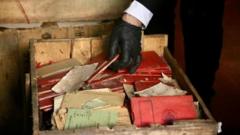In an intriguing discovery, workers at Argentina's Supreme Court found crates containing documents from Nazi Germany in the building's basement. This surprising find was made during preparations to relocate the court's archives to a newly established museum. According to court officials, these documents were sent by the German embassy in Tokyo, arriving in Argentina on June 20, 1941, inside 83 diplomatic pouches aboard a Japanese steamship.
Initially, Argentine customs officials confiscated the materials after opening five pouches at random and discovering Nazi propaganda within. Among the contents of the rediscovered crates were wooden champagne boxes filled with documents that aimed to promote Adolf Hitler's ideology in Argentina during World War II.
After their discovery last week, the crates were promptly secured, and court officials contacted the Buenos Aires Holocaust Museum for assistance in inventorying the materials. The court shared that among the documents were black-and-white photographs and membership booklets adorned with swastikas.
Historians are optimistic that these documents could provide insights into the financial networks and international connections of the Nazis. Further investigation revealed that the documents declared as "personal effects" by the German embassy raised suspicion due to the shipment's considerable size. Consequently, Argentine authorities alerted the foreign minister regarding concerns that the materials could threaten the nation’s neutral stance during the war.
The five pouches that were opened revealed various postcards, photographs, and Nazi propaganda materials. The German embassy requested the return of these items to Tokyo, where they originated, but an Argentine judge ordered the seizure of all 83 pouches in September 1941. The Supreme Court was left with the responsibility of determining their fate, yet a decision wasn't reached until 1944 when Argentina severed ties with the Axis powers. This lapse in action resulted in the crates remaining hidden in the court's basement for decades.
Post-World War II, under President Juan Perón, Argentina became a haven for high-ranking Nazi officials, including notorious figures Adolf Eichmann and Josef Mengele. In 2000, the Argentine government extended an official apology for its past role in providing sanctuary to Nazi war criminals.






















